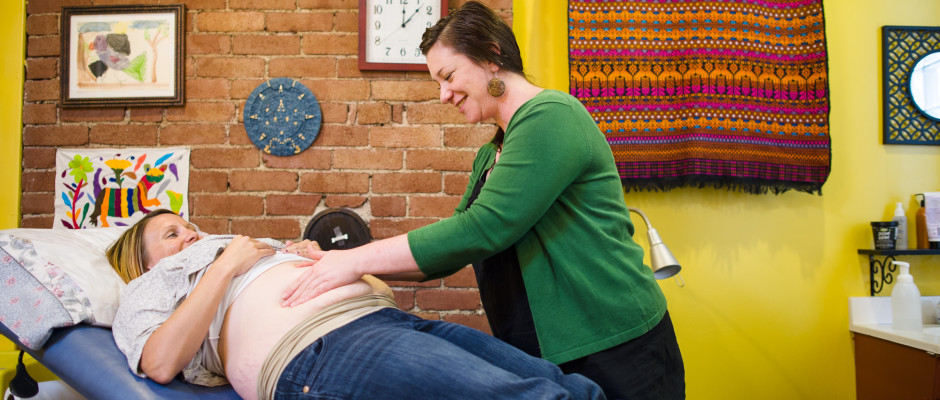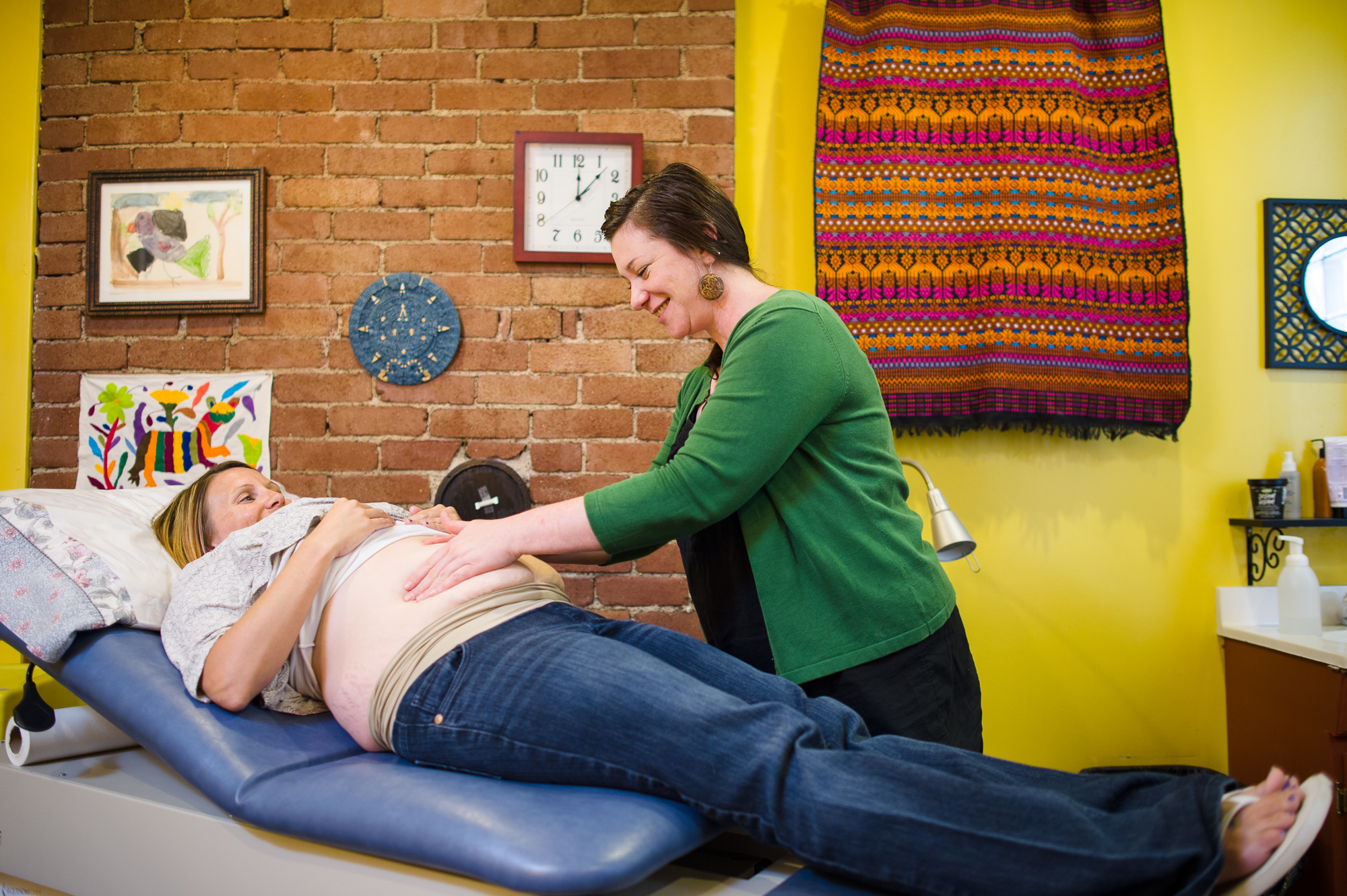Pittsburgh is a great place to be a kid — all it takes is one ride down the blue slide in Frick Park on an old pizza box. Fortunately, beautiful parks, a first-rate children's museum and hundreds of local programs aimed at the under-18 set aren’t the only reasons why.
Pittsburgh is booming with resources for young families. There's a store where mothers can try on nursing bras of all sizes, buy a maternity dress fit for a formal wedding, and even buy bathing suits made just for breastfeeding moms. There's also a spot filled with cloth diapers and a plethora of local pediatrics practices running free support groups for new moms, facilitated by counselors with decades of experience working with young families.
The city also teems with groundbreaking research, woman-centered prenatal care, and a wide array of birthing options that help give kids the best possible start in this world.
Pregnancy Pharmacology
Dr. Steve Caritis loves medicine because of his burning curiosity — he needs to know if something will work and why.
Caritis has been an obstetrician at Magee Women's Hospital since 1970. There, he observed that the average pregnant woman in the United States takes seven different medications, yet none have been approved by the FDA for use in pregnancy — nobody had studied the effects of medications in pregnant women. The dosage recommendations for everything from aspirin to insulin are based on non-pregnant women or males. Nobody was taking altered kidney or liver function during pregnancy into consideration.
“[In pregnancy], a time when we need the best pharmacologic information for the fetus and the mother, we have almost none,” he explains.
But that's changing, thanks to his work with the Obstetric-Fetal Pharmacology Research Unit (OPRU) Network. In 2004, the National Institutes of Health funded four centers in the country to research the pharmacology of various medications in pregnancy; Pittsburgh's Magee-Women's Hospital was the first. Finally, Caritis is able to conduct research studies that examine the dosage of different medications in the pregnant body and how they interact specifically with the placenta and unborn baby.
Right away, Caritis helped get FDA approval for Diclectin, a drug that prevents nausea and vomiting in pregnant women. He's now developing a patch for pregnant women to provide consistent relief — but discovering that there's something unique about the skin of pregnant women that causes the patch adhesive not to work. Women who sign up for his research studies can help the world figure out what, exactly, is going on.
Banking on Babies' Health
More than 400 babies are born prematurely each year in Allegheny County. As a result, there is a high demand for human milk, the ideal substance to support these infants who are often extremely small, around 3.3 pounds.
Unfortunately, many of the things that cause babies to be born prematurely can also significantly affect a mother’s ability to produce milk. Up to 70 percent of mothers who deliver prematurely initially struggle to produce an adequate supply for their baby. While most Neonatal Intensive Care Units (NICUs) across the country utilize donor breast milk to fill the gap, the hospitals in our region rely on formula because there is not a human milk bank nearby.
Denise O'Connor, a local lactation consultant, saw this as a huge opportunity to improve the standard of care for premature infants in Western Pa. She's leading the charge to develop the Pittsburgh Three Rivers Mothers Milk Bank, a nonprofit organization that will screen and collect breast milk from donor mothers throughout a multi-state area, pasteurize the milk, barcode it and deliver it to NICUs throughout the region, tracking it like any other tissue donation.
O'Connor anticipates processing 250,000 ounces of breast milk per year; that milk will just barely meet the needs of local preemies weighing under 3 pounds.
Because of the incredible benefits donated human milk can offer NICU babies, every hospital system in the Pittsburgh region was eager to collaborate with O'Connor.
“When I approached the medical community, they were all immediately, enthusiastically on board,” she recalls.
Pittsburghers have been generous with their dollars, and the milk bank project has seen large grants from hospitals, pediatrics practices and individuals. Local nursing mothers are also opening up their freezers for milk banks. The Human Milk Banking Association of North America told O'Connor they receive more calls from potential donors living in PA than in any other state.
“We have moms willing and ready to pump and donate their own milk for what will be the only milk bank in the state,” says O'Connor.
 All of the birthing suites at The Midwife Center have jacuzzi tubs. Big Push for Midwives
All of the birthing suites at The Midwife Center have jacuzzi tubs. Big Push for Midwives
While it's great to know our region has several Level 3 NICUs and tertiary hospitals available for moms and babies requiring urgent medical care, Pittsburgh is also home to a facility that offers a diferent kind of support for pregnant women. The Midwife Center for Birth & Women's Health is one of the oldest and largest freestanding birth centers in the country; it has been operating in Pittsburgh since 1982.
According to Executive Director Christine Haas, the center has seen a 100 percent increase in use over the last six years — the practice caught 423 babies in 2013, double the number from 2007.
Clinical director and midwife Ann McCarthy notes that women many begin researching during their pregnancies and learn that some of the interventions being performed in hospitals do not impact birth outcomes. The national cesarean section rate, for instance, is 32.8 percent overall but 25 percent for low-risk women.
“Our cesarean rate in 2013 was 8.5 percent with no increase in morbidity or mortality,” says McCarthy.
Another reason 'Burghers might turn to the brightly painted building in the Strip District for their birth could be cost. The Midwife Center publishes their costs and operates as a nonprofit.
“It's much more cost effective to deliver here — we have women who never even meet their insurance deductibles,” explains McCarthy.
Prenatal visits with the midwives include the same standard blood and urine screenings as an obstetric practice, and even ultrasounds and other tests if families choose to utilize them. Each appointment can last up to an hour, with the midwives educating families, engaging siblings and really working to decrease fear.
The Center's midwives are partnered with UPMC Mercy hospital, so if patients choose a hospital delivery, or if they require a transfer for something like an epidural or complication, their midwives travel with them, work closely with hospital physicians, and remain the primary caregiver throughout their birth and postnatal care.
There is also the option for mothers to deliver at the Midwife Center in one of three nature-themed bedrooms. These women typically head home within a few hours of giving birth and receive home visits from an RN to make sure everyone is healthy.
“No matter how the pregnancy and the birth goes, as long as the mother is engaged in the decision-making along the way, she feels less fear and gets started off on a better foot into motherhood,” says McCarthy.
 Artist rendering of the new labor and delivery suites at Jefferson Regional Hospital. More options for South Hills moms
Artist rendering of the new labor and delivery suites at Jefferson Regional Hospital. More options for South Hills moms
In April 2013, after a lifetime studying and working at Western Pennsylvania Hospital, David Logan decided to accept a new offer: he is now the division chief of Obstetrics and Gynecology for Jefferson Regional Medical Center and medical director of Jefferson Women's Health, the first OB/GYN group to serve the hospital in Jefferson Hills.
When he was a resident at West Penn Hospital in the '90s, Logan got a call. Was he available to come, quickly, to the Midwife Center to help stitch a newly delivered mother experiencing heavy bleeding? Curious to meet the midwives and see the center, he literally ran out of the hospital and jogged a mile down the hill to check on the patient.
Logan, who eventually worked his way up to president of medical staff at West Penn Hospital, has always been interested in a model of care that honors his patients.
In the beginning, that meant honing non-invasive techniques in gynecological surgery — more technical and tricky for the surgeon, but resulting in less blood loss, easier recovery and less infection for the patient.
Logan also mastered laparoscopy and robotic surgical techniques that drew many patients to his former practice, Century Medical Associates, the largest OB/GYN practice at West Penn Hospital. Additionally, he was named associate professor of Obstetrics and Gynecology for the Temple School of Medicine clinical campus at West Penn, where medical students came to study pelvic surgery techniques, among other skills.
Offering labor and delivery at Jefferson Regional, a community hospital, is important to Logan, who points out that there are few options for birthing women in the South Hills of Pittsburgh. As many smaller hospitals closed their maternity wards, Logan saw a “need and a burden for patients living in certain areas.”
In Clairton, for example, Logan says many patients do not have their own vehicle.
“How can they drive to hospitals like St. Clair or Magee or West Penn? They have a hard enough time making it in for office visits,” he remarks.
He estimates that 3,500 patients from the South Hills will deliver at Jefferson each year; these low-risk women will have access to all the amenities available in a larger hospital. There will be level 1 and 2 NICUs and high-risk patients will have their care transferred to West Penn Hospital; they even have the option of helicopter transfer if necessary.
“I've dedicated my entire life to Pittsburgh,” says Logan. “I was born in Pitcairn, went to college and medical school here, and have stayed on to build my career. Now I speak for Jefferson in saying we want women to have a safe and healthy delivery, and we want to offer comprehensive care to the women and families in this area.”



